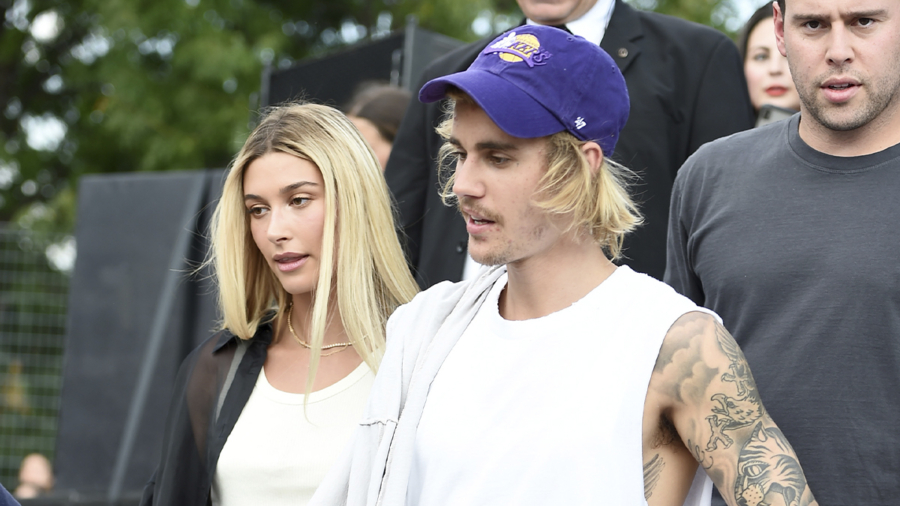Justin Bieber’s wife has given a positive health update to fans after her husband was diagnosed with a rare neurological disorder that caused paralysis on one side of his face.
“He’s doing really well. He’s getting better every single day,” Hailey Bieber said during an interview with Good Morning America that was posted to Twitter on Wednesday. “He’s feeling a lot better and, obviously, it was just a very scary and random situation to happen but he’s going to be totally OK.”
“I’m just grateful that he’s fine,” she added. “The support has been really amazing just from fans, friends, family. Every single person has sent well wishes, advice, recommendations. It’s actually been really amazing.”
Last week, Bieber uploaded a video on Instagram in which the 28-year-old Canadian singer explained that he was diagnosed with Ramsay Hunt Syndrome (RHS), a disorder that causes facial paralysis and affects nerves in the face through a shingles outbreak.
Bieber revealed that the reason for postponing several shows of his 2022 “Justice World Tour” was due to his diagnosis, which came just months after his wife struggled with overcoming her own health problem.
In March, Hailey was hospitalized due to a small blood clot in her brain. The 25-year-old model later confirmed she suffered from a mini-stroke and had to undergo surgery to close a hole in her heart.
Hailey revealed in a video in late April that doctors gave her three contributing factors that they believe made the blood clot happen. She said it included her recently starting birth control pills, her recent COVID-19 infection, as well as a long flight from Paris to Los Angeles.
Bieber can be seen in the June 10 clip pointing out his inability to successfully close his right eyelid, explaining that he’s unable to “smile with this side of my face, this nostril will not move, so there is full paralysis in this side of my face.”
Dit bericht op Instagram bekijken
According to the Mayo Clinic, the disorder (RHS) the singer has been diagnosed with is caused by the same virus that causes chickenpox. After the disease clears up, the virus remains in a person’s nerves and may reactivate years later.
Unlike chickenpox, RHS isn’t contagious and is more common in older people, typically in those above 60. For most people, the symptoms are temporary, though they can become permanent.
Bieber explained that he’s unsure about the estimated timeline for his recovery, but he is hopeful about making a full recovery through rest and therapy.
Hong Kong Study Suggests Possible Link Between RHS and COVID-19 Vaccine
After news broke of Bieber’s RHS diagnosis, social media has been filled with posts linking the singer’s diagnosis to the COVID-19 vaccine, claiming that he had developed the disorder because of it. However, the singer has never given an official confirmation on whether he is vaccinated against COVID-19.
The Postgraduate Medical Journal has previously released an article under the adverse drug reaction section on its website, pointing out a case in Hong Kong where a 37-year-old healthy man developed RHS two days after getting his first dose of the Pfizer-BioNTech vaccine.
According to the report, researchers said the patient’s symptoms apparently started with a fever and pain in the right ear. He then developed vesicles in his right ear and canal, which later developed into tinnitus and led to a loss of hearing. He also complained of facial palsy, numbness in the tongue, and dysgeusia.
Researchers concluded that RHS “is rare for patients under 60 years old with no previous history” of herpes zoster (HZ) or shingles.
“Therefore, COVID-19 vaccination was likely to be the stress-causing reactivation of VZV [Varicella Zoster Virus],” it said. VZV causes chickenpox, which commonly affects children and young adults.
“What we have described is rare,” researchers stressed.
The man in Hong Kong was the first reported case of RHS shortly after the COVID-19 vaccination. The case has been debunked by medical officials who say there is no evidence of such a link.
Facial Palsy UK, a charity dedicated to supporting individuals affected by facial paralysis, said in a statement obtained by Euro News that there is “no strong evidence” that the COVID-19 vaccine is linked to RHS as it is caused when a virus attacks the nerves present in the inner ear.
“Currently there is no strong evidence that the numbers of reported cases of Bell’s palsy or [RHS] are higher than would be expected in the general population,” the charity said. “One of the difficulties is that side effects are identified based on reporting, so some things that are reported could be associations rather than causative.”
The organization’s findings have been opposed by other researchers, who discovered the Pfizer-BioNTech vaccine could be associated with a small increase in the risk of Bell’s palsy, particularly among individuals previously diagnosed with the type of facial paralysis.
“Our findings suggest an overall increased risk of Bell’s palsy after CoronaVac vaccination,” according to a Lancet study published in August 2021. The medical journal added that “additional studies are needed in other regions to confirm our findings.”

